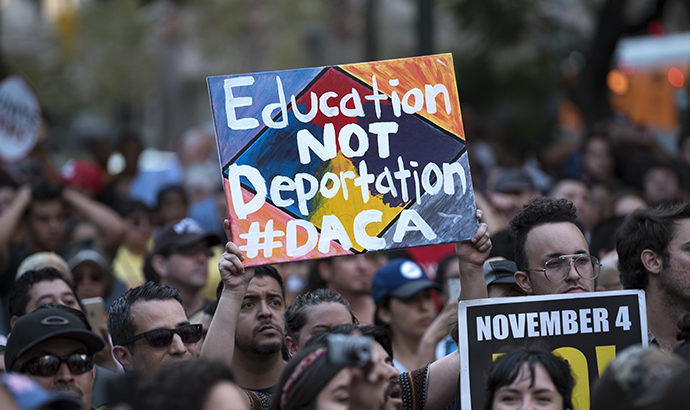Fear Remains for Immigrant Youth as Federal Court Hands Trump Another Blow on DACA Repeal
ByMark Keierleber
Read the full article at The74million.org >
The Trump administration had just announced its plan to phase out a program that protects some young undocumented immigrants from deportation when Melissa, a high school senior in New York, faced a tough decision.
Born in the Dominican Republic and brought to New York as a toddler, Melissa became a Deferred Action for Childhood Arrivals recipient in the eighth grade. Dreamers, as DACA recipients are often called, must renew their status with the government every two years. Melissa, a senior at KIPP NYC College Prep in New York, began that process in November. With uncertainty surrounding DACA’s fate, however, Melissa wondered whether it was worth the effort to renew — or if her application could put her family at risk.
“I didn’t want to not renew it because I feel like I still need it to do everything and to have a future here, but in the back of my mind I always worried whether it was actually going to go through or if me renewing it was going to be used against me,” said Melissa, who plans to attend Hunter College in New York City this fall.
The uncertainty for Melissa and Dreamers like her continues, even after a federal judge in Washington, D.C., handed a stiff blow Tuesday to the Trump administration, ordering the government to keep the Obama-era program in place. In the ruling, Judge John Bates of the Federal District Court for the District of Columbia gave the Trump administration 90 days to better explain its motive in terminating DACA before it would have to accept new applications. Bates, who was nominated by then-President George W. Bush, said in the decision the Trump administration’s rationale to terminate DACA was “virtually unexplained.” The Trump administration aimed to end the program by March, a deadline Bates said was “arbitrary and capricious.”
Although Tuesday’s ruling was a major victory for young undocumented immigrants who receive deportation relief and work authorization through the program, it remains unclear whether it will motivate DACA recipients to renew their applications, or whether other eligible undocumented immigrants will feel encouraged to sign up.
Seven months after the Trump administration announced in September that the government would phase out the program, uncertainty persists for young undocumented immigrants like Melissa, who asked that her last name be withheld to protect her from potential retaliation. Mistrust of the government remains, she said, even as federal judges rule in her favor.
Federal courts have handed three blows to the Trump administration since it moved to kill off DACA. Two previous federal injunctions ordered the Trump administration to continue accepting renewal applications. Unlike Tuesday’s ruling, they did not cover DACA-eligible immigrants who have not yet enrolled.
Following Tuesday’s order, the Justice Department said in a statement it will “continue to vigorously defend” Trump’s authority to terminate the program. When announcing DACA would be eliminated, Attorney General Jeff Sessions argued that the program was created through an unlawful executive order.
The latest ruling was prompted by lawsuits filed against the government by the NAACP, Princeton University, and Microsoft. Although the decision doesn’t resolve uncertainty for DACA beneficiaries, Princeton President Christopher Eisgruber said in a statement, it “unequivocally rejects the rationale the government has offered for ending the program.”
Since a federal court in California issued its injunction in January, only a small portion of DACA recipients with expiring protections have applied to renew their status, according to new U.S. Citizenship and Immigration Services data. In fact, 70 percent of people whose DACA protections expired between October and March have lost their status.
Melissa ultimately decided to move forward with her renewal, and although she said the process was more onerous than in the past, her application was accepted. But even as Melissa had a final meeting on her renewal Wednesday, it remains unclear what effect recent federal court rulings will have.
Between January and March, U.S. Citizenship and Immigration Services approved more than 55,000 DACA applications. Meanwhile, more than 9,000 people with expired protections are waiting for their applications to be approved, meaning they currently do not have work authorization or protection from deportation.
Tuesday’s federal ruling could affect thousands of high school students across the country. Currently, about 700,000 people have DACA protections, though about 1.3 million people were eligible as of 2017, according to the Migration Policy Institute, a nonpartisan think tank. That tally includes roughly 120,000 teens who will become eligible on their 15th birthday, provided they remain enrolled in school.
When President Barack Obama signed an executive order in 2012 to create the program, eligible immigrants were cautious about whether to hand over their personal information to the government, said Dave Levin, co-founder of KIPP, a charter school chain with more than 200 campuses serving nearly 90,000 students. Those fears among young immigrants have escalated, Levin said, since the Trump administration moved to terminate the program. He was optimistic about the latest court ruling but said more needs to be done. After months of heated debates in Washington, efforts to find a legislative fix have fallen flat.
Levin is among education leaders, from union presidents to former education secretaries, urging Congress to pass legislation to protect Dreamers. KIPP doesn’t ask students about their immigration status, Levin said, so he could not say how many students are DACA-eligible.
“Based on what I’ve heard over the last year, there is so little faith right now in our government,” Levin said. “There’s so little faith that our government will be able to honor the commitments that are made, so I don’t totally know that this [court ruling] will put people’s minds at ease.”
